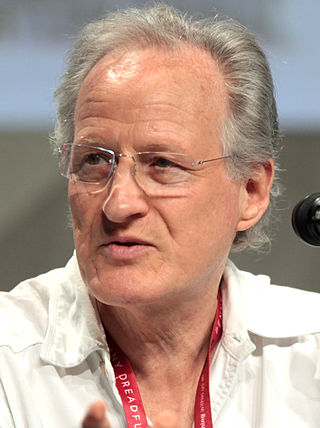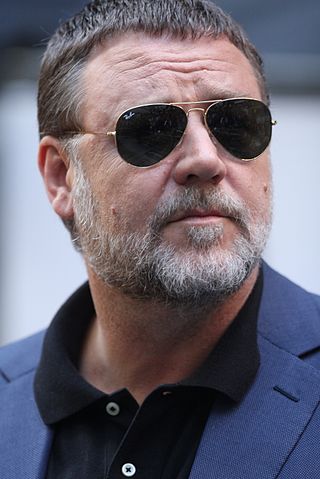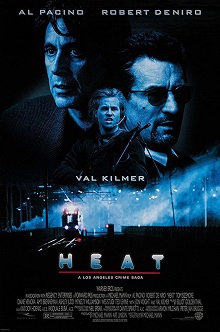
Michael Kenneth Mann is an American film director, screenwriter, author, and producer, best known for his stylized crime dramas. Mann has received numerous accolades including a BAFTA Award and two Primetime Emmy Awards as well as nominations for four Academy Awards and two Golden Globe Awards. His most acclaimed works include the films Thief (1981), Manhunter (1986), The Last of the Mohicans (1992), Heat (1995), The Insider (1999), Ali (2001), Collateral (2004), Public Enemies (2009), and Ferrari (2023). He is also known for his role as executive producer on the popular TV series Miami Vice (1984–90), which he adapted into a 2006 feature film.

Russell Ira Crowe is an actor. He was born in New Zealand, spending 10 years of his childhood in Australia and residing there permanently by age 21. His work on screen has earned him various accolades, including an Academy Award, two Golden Globe Awards, and a British Academy Film Award.

60 Minutes is an American television news magazine broadcast on the CBS television network. Debuting in 1968, the program was created by Don Hewitt and Bill Leonard, who distinguished it from other news programs by using a unique style of reporter-centered investigation. In 2002, 60 Minutes was ranked number six on TV Guide's list of the "50 Greatest TV Shows of All Time", and in 2013, it was ranked number 24 on the magazine's list of the "60 Best Series of All Time". In 2023, Variety ranked 60 Minutes as the twentieth-greatest TV show of all time. The New York Times has called it "one of the most esteemed news magazines on American television".

Alfredo James Pacino is an American actor. Considered one of the greatest and most influential actors of the 20th century, Pacino has received numerous accolades including an Academy Award, two Tony Awards, and two Primetime Emmy Awards, achieving the Triple Crown of Acting. He also received four Golden Globe Awards, a BAFTA, two Screen Actors Guild Awards, and was honored with the Cecil B. DeMille Award in 2001, the AFI Life Achievement Award in 2007, the National Medal of Arts in 2011, and the Kennedy Center Honors in 2016.

Heat is a 1995 American crime film written and directed by Michael Mann. It features an ensemble cast led by Al Pacino and Robert De Niro, with Val Kilmer, Tom Sizemore, Diane Venora, Amy Brenneman, Ashley Judd, Wes Studi, Jon Voight, Ted Levine, Dennis Haysbert, and Danny Trejo in supporting roles. The film follows the conflict between an LAPD detective and a career criminal while also depicting its effect on their professional relationships and personal lives.

Ali is a 2001 American biographical sports drama film co-written, produced and directed by Michael Mann. The film focuses on ten years in the life of the boxer Muhammad Ali, played by Will Smith, from 1964 to 1974, featuring his capture of the heavyweight title from Sonny Liston, his conversion to Islam, criticism of the Vietnam War, and banishment from boxing, his return to fight Joe Frazier in 1971, and, finally, his reclaiming the title from George Foreman in the Rumble in the Jungle fight of 1974. It also touches on the great social and political upheaval in the United States following the assassinations of Malcolm X and Martin Luther King Jr.

Arthur Christopher Orme Plummer was a Canadian actor. His career spanned seven decades, gaining him recognition for his performances in film, stage, and television. His accolades included an Academy Award, two Tony Awards, and two Primetime Emmy Awards, making him the only Canadian recipient of the "Triple Crown of Acting". He also received a BAFTA Award, a Golden Globe Award, and Screen Actors Guild Award as well as a nomination for a Grammy Award.

Lowell Bergman is an American journalist, television producer, and professor of journalism. In a career spanning nearly five decades, Bergman worked as a producer, a reporter, and then the director of investigative reporting at ABC News and as a producer for CBS's 60 Minutes, leaving in 1998 as the senior producer of investigations for CBS News. He was also the founder of the investigative reporting program at the Graduate School of Journalism at UC Berkeley and, for 28 years, taught there as a professor. He was also a producer and correspondent for the PBS documentary series Frontline. In 2019, Bergman retired.

Brown & Williamson Tobacco Corporation was a U.S. tobacco company and a subsidiary of multinational British American Tobacco that produced several popular cigarette brands. It became infamous as the focus of investigations for chemically enhancing the addictiveness of cigarettes. Its former vice-president of research and development, Jeffrey Wigand, was the whistleblower in an investigation conducted by CBS news program 60 Minutes, an event that was dramatized in the film The Insider (1999). Wigand claimed that B&W had introduced chemicals such as ammonia into cigarettes to increase nicotine delivery and increase addictiveness.

Jeffrey Stephen Wigand is an American biochemist and whistleblower.

Myron Leon Wallace was an American journalist, game show host, actor, and media personality. Known for his investigative journalism, he interviewed a wide range of prominent newsmakers during his seven-decade career. He was one of the original correspondents featured on CBS news program 60 Minutes, which debuted in 1968. Wallace retired as a regular full-time correspondent in 2006, but still appeared occasionally on the series until 2008. He was the father of Chris Wallace.
John Arthur Palladino was an American private investigator and attorney. In 1977 he founded the private detective agency Palladino & Sutherland with his wife, Sandra Sutherland, and over a career spanning more than four decades, Palladino specialized in the preparation for trial of witnesses and evidence in litigation. He was best known for his work in the Peoples Temple tragedy, his defense of car maker John DeLorean, for the Bill Clinton presidential election committee, the tobacco industry whistleblower Jeffrey Wigand, singer Courtney Love, and musician R. Kelly.

Donald Shepard Hewitt was an American television news producer and executive, best known for creating the CBS television news magazine 60 Minutes in 1968, which at the time of his death was the longest-running prime-time broadcast on American television. Under Hewitt's leadership, 60 Minutes was the only news program ever rated as the nation's top-ranked television program, an achievement it accomplished five times. Hewitt produced the first televised presidential debate in 1960.
The 3rd Online Film Critics Society Awards, honoring the best in film for 1999, were given in 2000.
The 25th Los Angeles Film Critics Association Awards, honoring the best in film for 1999, were announced on December 11, 1999 and awarded on January 19, 2000.

Marie Harriet Brenner is an American author, investigative journalist and writer-at-large for Vanity Fair. She has also written for New York, The New Yorker and the Boston Herald and has taught at Columbia University's Graduate School of Journalism. Her 1996 Vanity Fair article on tobacco insider Jeffrey Wigand, "The Man Who Knew Too Much", inspired the 1999 movie The Insider, starring Russell Crowe and Al Pacino. Her February 1997 Vanity Fair article "American Tragedy: The Ballad of Richard Jewell" partially inspired the 2019 film Richard Jewell directed by Clint Eastwood.
Andrew McGuire is an American trauma prevention specialist and grassroots campaigner. He was the first Executive Director of Action Against Burns, founder and Executive Director of the Burn Council, which was renamed the Trauma Foundation, in 1981. He is currently the Executive Director of California OneCare, a campaign to establish a "Medicare for All" type health insurance for all residents of California.

Russell Crowe is an actor. He gained international attention for his role as Roman General Maximus Decimus Meridius in the 2000 epic historical film Gladiator, for which he won an Academy Award for Best Actor. Crowe's other performances include tobacco firm whistle-blower Jeffrey Wigand in the drama film The Insider (1999) and mathematician John Forbes Nash Jr. in the biopic A Beautiful Mind (2001). He has also starred in films Romper Stomper with Daniel Pollock (1992), The Quick and the Dead with Sharon Stone (1995), L.A. Confidential with Guy Pearce (1997), Master and Commander: The Far Side of the World with Paul Bettany (2003), Cinderella Man with Renée Zellweger (2005), 3:10 to Yuma with Christian Bale (2007), American Gangster with Denzel Washington (2007), State of Play with Ben Affleck (2009), and Robin Hood with Cate Blanchett (2010).
Gavin Hall MacFadyen was an American investigative journalist and documentary filmmaker. He was the director of the Centre for Investigative Journalism (CIJ) at Goldsmiths, University of London; Co-Founder with Eileen Chubb of the UK whistleblower support group, The Whistler; and a Trustee of the Courage Foundation. He was acknowledged as a ″beloved director of WikiLeaks″ shortly after his death in 2016.

Mike Wallace Is Here is a 2019 biographical documentary film directed by Avi Belkin. It was produced by Rafael Marmor, Peggy Drexler, John Battsek, Avi Belkin, and Chris Leggett, under the banner of Drexler Films, Delirio Films and Rock Paper Scissors Entertainment. The film follows the life and career of American journalist Mike Wallace, using never-before-seen archival footage of the journalist preparing for and speaking about his work.















